
President Bola Tinubu has given insights into the forthcoming minimum wage for Nigerian workers, acknowledging the challenges posed by the increased cost of living. Recognized as the Person of the Year by this newspaper’s editors, Tinubu emphasized that the upcoming wage structure would be practical, sustainable, and applicable across all levels of government.
Addressing questions about his tenure as Nigeria’s President, Tinubu highlighted the positive outcomes of the economic reforms implemented by his administration. These outcomes include attracting $616 million in Foreign Direct Investment (FDI) pledges.
When prompted about the ongoing cost-of-living challenges in the country, attributed to inflation, high fuel prices, and currency devaluation, Tinubu expressed his awareness of the severe impact on Nigerians. He stated, “ As your President, I am deeply aware of the economic crisis’s severe impact on Nigerians, and we are part of a global challenge with the rising costs of living.
“To help our people, my administration is taking proactive steps. We are focused on providing financial support to businesses and ensuring the availability and affordability of staple foods, which are essential for every Nigerian family.
“One of our key initiatives is the provision of N25,000 monthly to 15 million households, for a three-month period. To further support food security, we’re working with our partners, local and international, to improve agricultural practices and provide essential resources to farmers.
“In addition, the National Single Window Project is being implemented to enhance international trade efficiency.
“All these efforts are in line with our commitment to reducing the economic burden on our citizens, especially the working class and vulnerable groups.”
According to him,the reallocation of funds from the removal of the petrol subsidy is also “a strategic move to bolster our government’s finances, contributing to a stable economic environment for all.”
He added: “ in our commitment to ease the economic strain on our citizens, particularly the working class and vulnerable groups, my administration is championing the shift to cleaner energy sources.
“We recognize the benefits of Compressed Natural Gas (CNG) in providing an affordable and cleaner mass transit system. To facilitate this, we have waived the Value Added Tax (VAT) on CNG purchases. Additionally, to reduce the costs in food transportation and manufacturing, we’ve also waived VAT on diesel for six months.”
He acknowledged that “these massively important reforms have been hard” but pointed out that they have started yielding positive results for the country.
His words: “ the dividends are already manifesting, with even more in sight. We have already seen improvements in our economic outlook, as corroborated by the likes of Fitch and Moody’s. These may seem ‘academic’ to many but the impact on investor confidence is significant.”
Asked to respond to criticism of the cash transfer initiative of his government, which some see as superficial and incapable of addressing the level of poverty in the land,Tinubu insisted that he remains steadfast in “my belief in the efficacy of our cash transfer initiatives. “
He said: “These initiatives are a crucial part of our strategy to target and provide relief to the most vulnerable segments of our population, especially during the last three months of the year when the prices of basic items typically rise.
“This is not just about providing temporary support; it’s about strategically delivering assistance when it’s needed most. We continue to work closely with all key stakeholders – including state governments, civil society groups, international partners, and private sector entities like telcos and fintechs – to refine these programs. Moreover, we urge all Nigerians to be mindful of the current economic situation and avoid exploiting it for abnormal profits.
“In addition to these cash transfers, my administration is deeply committed to empowering micro, small, and medium-sized enterprises, along with nano businesses. Significant financial support is being directed to these enterprises to foster human capital development, economic growth, and financial inclusion.
“For instance, through the Ministry of Communications, Innovation, and Digital Economy, we launched the 3MTT programme, aiming to develop technical talent across Nigeria in fields such as software engineering and cloud computing. This program is designed not just to aid businesses but also to enable our youth to participate in the global gig economy, earning competitive wages while contributing to our nation’s growth.
“Our interventions extend beyond what some may call ‘cash handouts’. They are about creating a sustainable environment where Nigerians can innovate and thrive. By focusing on sectors like digital and creative industries, we are fostering growth and job creation, harmonizing efforts between monetary and fiscal bodies to build a stronger, more resilient Nigeria.
On the planned new wage structure, why it is yet to take off and fears about the ability of some of the states to implement it when the last one has not even been fully adopted all over the country,the president said: “I understand the concerns regarding the unveiling of the new minimum wage and how states will manage these changes, especially those with fewer resources.
“To address this, my administration has approved a provisional increase in the federal minimum wage to N35,000 per month for a six-month period, two months of which have already been paid. This decision follows extensive consultations with the Nigeria Labour Congress (NLC) and Trade Union Congress (TUC).
“In managing the situation with the states, we are working closely with them to ensure the new wage structure is practical and sustainable. It’s important that each state’s unique financial situation is considered.
“We are focused on strategies to help states strengthen their economies, considering factors like tax efficiency and economic diversification.
“We are committed to ongoing dialogues with labour unions and state governments. This collaborative approach is crucial to ensure that the new minimum wage is fair, reasonable, and implementable across all states. Our goal is to balance the economic well-being of our workers with the overall financial health of the nation.
“We ask Nigerians to rest assured that my administration will not rest until we have delivered a sustainable solution in the best interest of Nigerians.”
Tinubu,in response to a question on the benefits of his economic missions to some parts of the world so far,said: “ It is essential to place our initiatives within the broader context of our economic recovery and growth strategy. This strategy encompasses several key reforms, including the removal of fuel subsidies, the unification of the naira’s exchange rates, the adoption of the customs single-window, the streamlining of our tax system and enhancement and diversification of our revenues.
“These strategic moves are designed to enhance liquidity and create a more attractive investment environment for both domestic and foreign investors, thereby stimulating sustainable growth.
Foreign Direct Investment (FDI) is not ‘chicken change’. FDI is substantial, long-term financial commitments made by serious enterprises and investors.
“What is happening right now is that Nigeria is re-engaging with the global market – both foreign and domestic investors. We are telling the story of our significant and far-reaching reforms and rebuilding confidence in Nigeria as an accessible and safe investment.
“We are clearly communicating that ‘Nigeria is open for business’ and that the direction of travel is clear and fully committed.
“So far, our pursuit of foreign direct investment has been met with positive outcomes. We’ve secured a $500 million deal with Germany to fund renewable energy projects, particularly in rural Nigeria.
“Additionally, through local enterprises, Nigeria will supply LNG yearly to Germany, starting in 2026, solidifying our role as a key global energy partner. Our focused efforts to attract European FDI are yielding fruit, notably with the $116 million French investment in the I-DICE program, aimed at creating 65,000 start-ups and 150,000 jobs, particularly empowering women.
“As announced on the side-lines of COP28 in Dubai, we’re deploying 100 electric buses nationally, affirming our commitment to sustainable, eco friendly initiatives and creating a platform for Public-Private-Partnerships in the mass transit category.
“Since this announcement we have received serious requests for co-investment opportunities from within Nigeria and across the world – Europe, India, China and the Middle East, key global markets my administration has been energetically engaging with.”

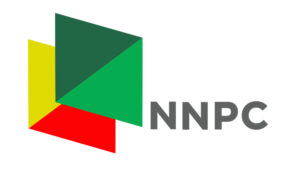
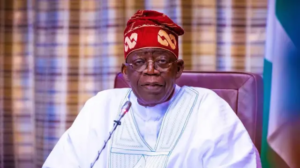
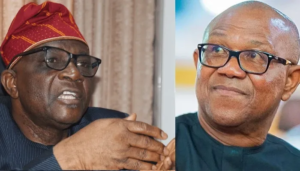
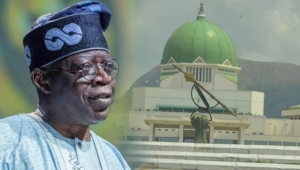
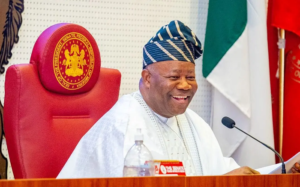
Be First to Comment